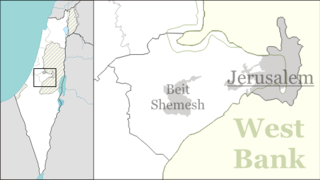The Black September Organization (BSO) was a Palestinian militant organization founded in 1970. Besides other actions, the group was responsible for the assassination of the Jordanian Prime Minister Wasfi Tal, and the Munich massacre, in which eleven Israeli athletes and officials were kidnapped and killed, as well as a West German policeman dying, during the 1972 Summer Olympics in Munich, their most publicized event. These attacks led to the creation or specialization of permanent counter-terrorism forces in many European countries.
Jewish extremist terrorism is terrorism, including religious terrorism, committed by extremists within Judaism.
Said Al Nasr was a Syrian Palestinian known for carrying out the 28 July 1980 Antwerp summer camp attack, in which he attacked a group of 40 Jewish children waiting with their families for a bus to take them to summer camp with hand grenades. One boy was killed, and eight others were seriously wounded.
Multiple terrorist attacks have occurred in Greece.

The Union Libérale Israélite de France (ULIF), commonly referred to as the rue Copernic synagogue, is a Liberal Jewish synagogue, located in Paris, France. Inaugurated on the first of December 1907, it is the oldest Reform synagogue in France.

On 3 October 1980, a bomb exploded outside the Rue Copernic synagogue in the 16th arrondissement of Paris, France, during Shabbat services. Approximately 320 worshippers were inside the synagogue when the bomb went off outside, killing four people and wounding 46. It was the first deadly attack against Jews in France since the end of the Second World War.
The 1981 Vienna synagogue attack was a terror attack that occurred 29 August 1981. The incident took place in the Stadttempel of Vienna, Austria carried out by two terrorists of the Abu Nidal Organization.

A bomb attack was carried out in a bus station in downtown Jerusalem, near the Jerusalem International Convention Center compound on 23 March 2011 at 15:00 (GMT+2). The bomb was placed near a bus stop, and detonated when Egged bus No.74 passed the station.

Terrorism in France refers to the terrorist attacks that have targeted the country and its population during the 20th and 21st centuries. Terrorism, in this case is much related to the country's history, international affairs and political approach. Legislation has been set up by lawmakers to fight terrorism in France.
On 22 July 1985, two bombs exploded in a terrorist attack in Copenhagen, Denmark. One of the bombs exploded near the Great Synagogue and a Jewish nursing home and kindergarten, and another at the offices of Northwest Orient Airlines. At least one more bomb, planned for the El Al airline offices, was discovered. One person was killed and 26 people were injured in the attacks. Sweden-based Palestinians Abu Talb and Marten Imandi were sentenced to life imprisonment in Sweden for the bombings, which were part of a series of attacks in 1985 and 1986, while two co-conspirators received lesser sentences of one and six years imprisonment.

The Brussels Islamic State terror cell was a group involved in large-scale terrorist attacks in Paris in November 2015 and Brussels in March 2016. The terror cell was connected to the Islamic State (IS), a jihadist terrorist organisation primarily based in Syria and Iraq.
On 27 July 1980, Said Al Nasr, a Syria-born Palestinian, used grenades to attack a group of 40 Jewish children waiting with their families for a bus to take them to summer camp. One boy was killed and 20 other people were wounded in the attack. The attacker was convicted.
Belgium is a European country with a Jewish population of approximately 35,000 out of a total population of about 11.4 million. It is among the countries experiencing an increase in both antisemitic attitudes and in physical attacks on Jews.
This article covers attacks and activity of terrorism in Belgium.
On 31 December 1980, New Year's Eve, a bomb exploded in The Norfolk Hotel in Nairobi, Kenya. It partially destroyed the hotel, killing 20 people and wounding another 87.
The 1973 Hellinikon International Airport attack was an attack at the Hellinikon International Airport at Athens, Greece. The two attackers were members of the Palestinian militant organization Black September. The militants used sub-machine guns and grenades against the passengers waiting in the passenger lounge. The attackers took hostages before they finally surrendered to the Greek police. It is believed that the gunmen wanted to hijack a plane, but they decided to attack when they were about to be searched by a Greek security inspector before boarding.




